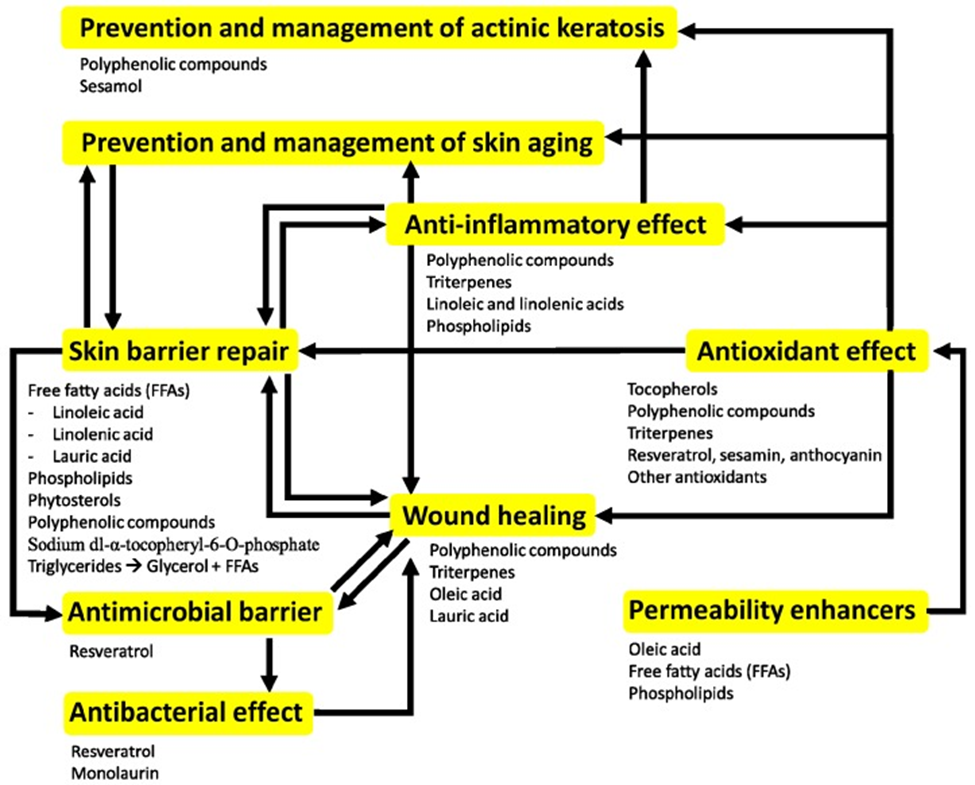The skin, our body’s largest organ, faces constant challenges from potentially harmful external stimuli such as microbes, UV rays, allergens, and irritants. In response, it activates an inflammatory process involving keratinocytes (skin cells) and innate immune cells (like leukocytes, mast cells, and dendritic cells), which produce various signaling molecules (cytokines, chemokines) and reactive oxygen species (ROS).
These substances help fight infections and facilitate tissue repair. Still, prolonged or excessive inflammation can damage healthy tissue and disrupt skin balance, leading to chronic inflammatory conditions such as atopic dermatitis (AD) or psoriasis.
Polyunsaturated fatty acids (PUFAs), especially linoleic and arachidonic acids, are critical in maintaining healthy skin and regulating inflammation. Linoleic acid deficiency in diets can result in a skin condition resembling AD. In contrast, arachidonic acid can be metabolized into substances that help maintain skin homeostasis or, if overproduced, promote inflammation and even skin cancer development.

Physiological responses result from the interaction between the bioactive compounds and the pathophysiological context of the skin.
Consequently, topical supplementation with plant oils rich in PUFAs and their anti-inflammatory metabolites may be useful as a standalone treatment or alongside standard therapies for inflammatory skin disorders and precancerous lesions.
|
Plant Oils |
Skin Barrier Repair |
Anti-Bacterial Effect |
Anti-Inflammatory Effect |
Antioxidant Effect |
Wound Healing |
Skin Aging |
Skin Cancer |
|
Olive oil |
No |
? |
Yes |
Yes |
Yes |
Possible effect |
Yes |
|
Sunflower seed oil |
Yes |
? |
Yes |
? |
Possible effect |
? |
Yes |
|
Grape seed oil |
? |
Yes |
Possible effect |
Yes |
Yes |
Possible effect |
Possible effect |
|
Coconut oil |
Yes |
Yes |
Yes |
Yes |
Yes |
Yes |
? |
|
Safflower seed oil |
? |
? |
Yes |
? |
? |
? |
? |
|
Argan oil |
Yes |
? |
Yes |
? |
Yes |
? |
Possible effect |
|
Soybean oil |
Yes |
Yes |
Yes |
Yes |
? |
? |
? |
|
Peanut oil |
Yes |
? |
? |
? |
? |
Yes |
Yes |
|
Sesame oil |
Possible effect |
? |
Yes |
Yes |
? |
Yes |
Yes |
|
Avocado oil |
? |
? |
Possible effect |
? |
Yes |
? |
? |
|
Borage oil |
Yes |
? |
Possible effect |
? |
? |
? |
? |
|
Jojoba oil |
Yes |
Possible effect |
Yes |
Yes |
Yes |
Yes |
? |
|
Oat oil |
Yes |
Possible effect |
Yes |
Yes |
? |
? |
? |
|
Pomegranate seed oil |
? |
? |
? |
Yes |
? |
Possible effect |
Possible effect |
|
Almond oil |
Possible effect |
? |
? |
? |
? |
Yes |
? |
|
Bitter apricot oil |
? |
? |
? |
? |
? |
? |
Possible effect |
|
Rose hip oil |
Possible effect |
? |
Yes |
Yes |
? |
Yes |
? |
|
German chamomile oil |
Possible effect |
? |
Yes |
? |
? |
? |
? |
|
Shea butter |
Possible effect |
? |
Yes |
Yes |
? |
? |
? |
When there is no concrete evidence for the specific effect of topical treatment of some plant oils, it is indicated with “?”.
Lin, Tzu-Kai et al. “Anti-Inflammatory and Skin Barrier Repair Effects of Topical Application of Some Plant Oils.” International journal of molecular sciences vol. 19,1 70. 27 Dec. 2017, doi:10.3390/ijms19010070 This article is an open access article distributed under the terms and conditions of the Creative Commons Attribution (CC BY) license (http://creativecommons.org/licenses/by/4.0/).